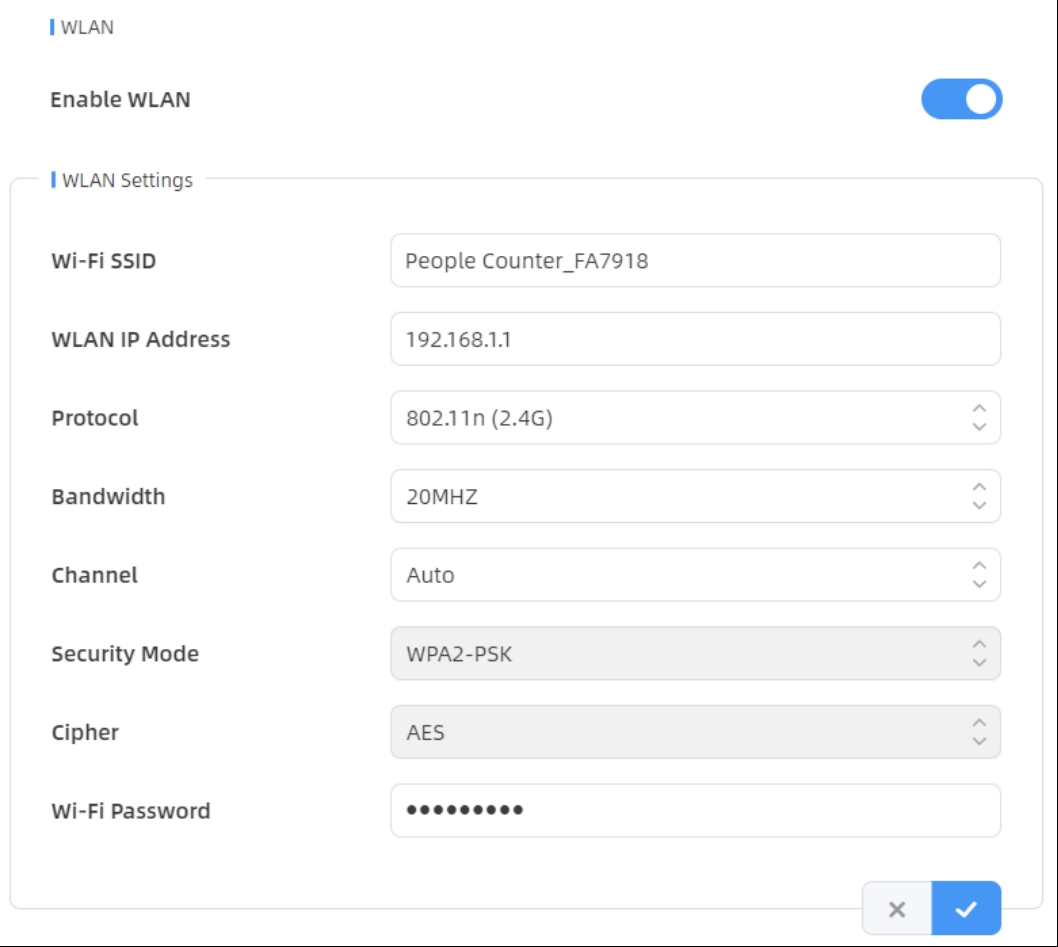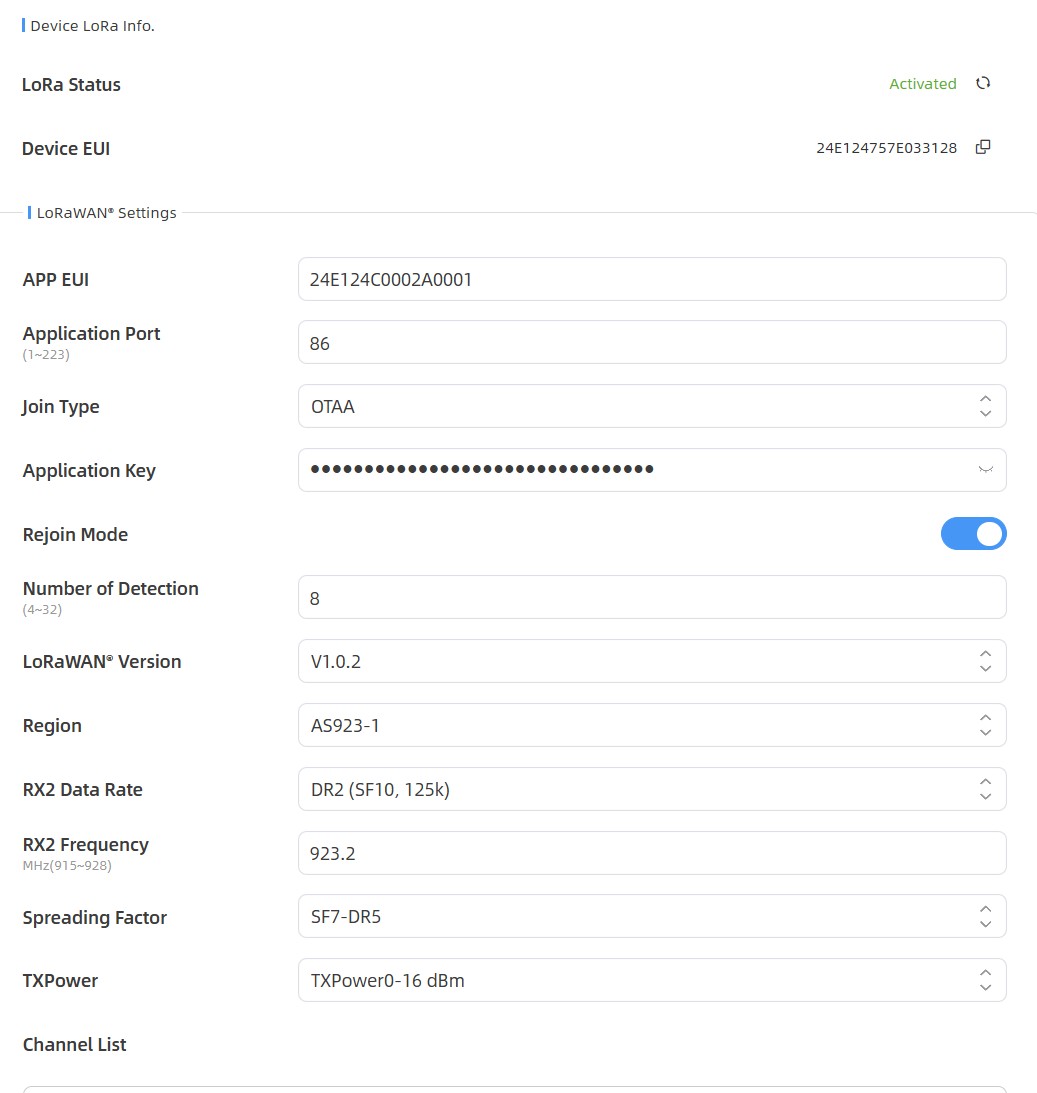Communication
WLAN
The device supports wlan feature to work as AP mode to configure device and it can not connect to other access point.

| Parameters | Description |
|---|---|
| Enable WLAN | Enable or disable Wi-Fi feature. If disabled, users can use button to enable it. |
| Wi-Fi SSID | The unique name for this device Wi-Fi access point, defined as People Counter_xxxxxx (can be found on the device label). |
| WLAN IP Address | Configure WLAN IP address for web access, the default IP address is 192.168.1.1. |
| Protocol | 802.11g (2.4 GHz) and 802.11n (2.4 GHz) are optional. |
| Bandwidth | 20 MHz or 40 MHz are optional. |
| Channel | Select the wireless channel. Auto, 1,...11 are optional. |
| Security Mode | Fixed is WPA2-PSK. |
| Cipher | Fixed is AES. |
| Wi-Fi Password | Customize the password, 8-63 characters, including numbers, lowercase letters, uppercase letters and special characters. |
LoRa
LoRa settings are used for configuring the transmission parameters in LoRaWAN® network.

| Parameters | Description |
|---|---|
| LoRa Status | LoRaWAN® network joining status of this device. |
| Device EUI | Unique ID of the device which can be found on the
device. Note: please contact sales for device
EUI list if you have many units. |
| App EUI | The default App EUI (join EUI) is 24E124C0002A0001. |
| Application Port | The port used for sending and receiving data, the default port is 85. |
| Join Type | OTAA and ABP mode are available. Note: it's necessary to select OTAA mode if
connecting device to Milesight IoT Cloud or Milesight Development
Platform. |
| Application Key | Appkey for OTAA mode, default value: "Device EUI" + "Device EUI"
(since Q4 of 2025). Example: 24e124123456789024e1241234567890 Note:
|
| Device Address | DevAddr for ABP mode, default is the 5th to 12th digits of SN. |
| Network Session Key | Nwkskey for ABP mode, the default is 5572404C696E6B4C6F52613230313823. |
| Application Session Key | Appskey for ABP mode, the default is 5572404C696E6B4C6F52613230313823. |
| Rejoin Mode |
Reporting interval≤35 mins: the device will send a specific number of LinkCheckReq MAC packets to the network server every reporting interval or every double reporting interval to validate connectivity; If there is no response, the device will re-join the network. Reporting interval > 35 mins: the device will send a specific number
of LinkCheckReq MAC packets to the network server every reporting
interval to validate connectivity; If there is no response, the
device will re-join the network.
Note:
|
| Number of Detection | When rejoin mode is enabled, set the
number of detection. Note: the actual sending
number is Number of Detection + 1. |
| LoRaWAN® Version | V1.0.2 and V1.0.3 are available. |
| Region | Frequency plan of this device. |
| RX2 Data Rate | RX2 data rate to receive downlinks. |
| RX2 Frequency | RX2 frequency to receive downlinks. Unit: MHz |
| Spreading Factor | If ADR mode is disabled, the device will send uplink data following this SF parameter. The higher the spreading factor, the longer the transmission distance, the slower the transmission speed and the more the consumption. |
| Tx Power | Tx power (transmit power) refers to the strength of the outgoing signal transmitted by the device. This is defined by LoRa alliance. |
| Channel List | Select the channel from channel list
or enter the index to select the frequency channel.
|
| Confirmed Mode |
If the device does not receive ACK packet from network server, it will resend data once. |
| ADR | Enable or disable network server to adjust Spreading Factor, Bandwidth an TX Power to optimize data rates, airtime and energy consumption in the network. |